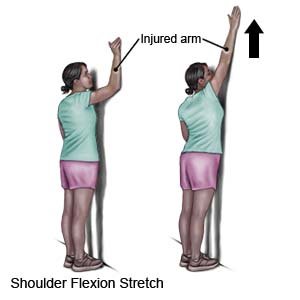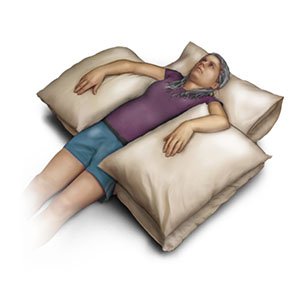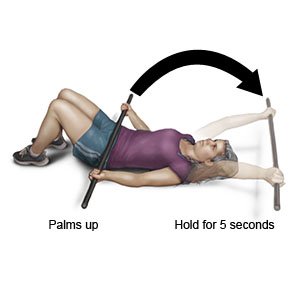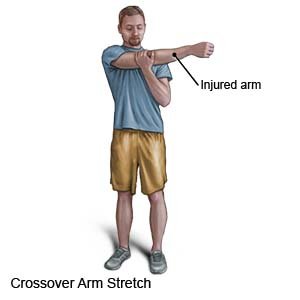Adhesive Capsulitis
Medically reviewed by Drugs.com. Last updated on Aug 4, 2025.
AMBULATORY CARE:
Adhesive capsulitis
happens when tissues in your shoulder tighten and swell. The condition is often called frozen shoulder because the swollen tissues cause pain and decrease your shoulder movement.
Common signs and symptoms:
- Shoulder pain and stiffness that gets worse over time
- Pain at night that wakes you
- An ache in your shoulder even at rest but that gets worse with movement
- Muscle spasms in your neck, shoulder joint, or near your collarbone
- Trouble reaching over your head or behind you
- Muscle weakness
Seek care immediately if:
- You have new or increased trouble moving your arm.
Related medications
Contact your healthcare provider if:
- You have worse pain and stiffness in your shoulder.
- You have questions or concerns about your condition.
Treatment:
The goal of treatment is to help you regain as much shoulder movement as possible. Treatment will depend on what stage you are in. Ask your healthcare provider about these and other treatments for adhesive capsulitis:
- Prescription pain medicine may be given. Ask your healthcare provider how to take this medicine safely. Some prescription pain medicines contain acetaminophen. Do not take other medicines that contain acetaminophen without talking to your healthcare provider. Too much acetaminophen may cause liver damage. Prescription pain medicine may cause constipation. Ask your healthcare provider how to prevent or treat constipation.
- NSAIDs help decrease swelling and pain or fever. This medicine is available with or without a doctor's order. NSAIDs can cause stomach bleeding or kidney problems in certain people. If you take blood thinner medicine, always ask your healthcare provider if NSAIDs are safe for you. Always read the medicine label and follow directions.
- Steroid medicine helps decrease pain and swelling. Healthcare providers may give this medicine as a shot into your shoulder.
- Physical therapy is used to teach you exercises to help improve movement and strength, and to decrease pain.
- Manipulation is a procedure used to move your shoulder. You will be given anesthesia to make you sleep through this procedure. Manipulation releases tightness in your shoulder and improves movement.
- Surgery may be used to cut the tissues in your shoulder to release the tightness. During surgery, swollen or damaged tissue may also be removed. Surgery may be needed if other treatments do not help.
Treatment options
The following list of medications are related to or used in the treatment of this condition.
Manage adhesive capsulitis:
- Stretches:
- Doorway stretch: Stand in a doorway with your painful arm bent at the elbow. Place your hand on the door frame and turn your body away from the door frame. Hold this position for 30 seconds. Relax and repeat.

- Forward stretch: Lie on your back with your legs straight out. Use your healthy arm to push your painful arm up over your head until you feel a gentle stretch. Hold this position for 15 seconds. Slowly lower your arm to the starting position. Relax and repeat.


- Crossover stretch: Use your healthy arm to gently pull your painful arm across your chest just below your chin. Pull until you feel a gentle stretch. Hold this position for 30 seconds. Relax and repeat.

- Doorway stretch: Stand in a doorway with your painful arm bent at the elbow. Place your hand on the door frame and turn your body away from the door frame. Hold this position for 30 seconds. Relax and repeat.
- Apply ice as directed. Ice helps decrease pain and swelling. Apply ice to help ease pain after stretching. Use an ice pack, or put crushed ice in a plastic bag. Cover it with a towel before you apply it to your shoulder. Apply ice for 15 to 20 minutes every hour, or as directed.
- Apply heat as directed. Heat helps relax muscles and may help improve shoulder movement. Use a heat pack, or soak a small towel in warm water. Wring out the extra water before you apply the towel to your shoulder. Apply heat for 20 to 30 minutes every hour, or as directed.
Follow up with your healthcare provider as directed:
Write down your questions so you remember to ask them during your visits.
© Copyright Merative 2025 Information is for End User's use only and may not be sold, redistributed or otherwise used for commercial purposes.
The above information is an educational aid only. It is not intended as medical advice for individual conditions or treatments. Talk to your doctor, nurse or pharmacist before following any medical regimen to see if it is safe and effective for you.
Learn more about Adhesive Capsulitis
Treatment options
Care guides
Symptoms and treatments
Medicine.com guides (external)
Further information
Always consult your healthcare provider to ensure the information displayed on this page applies to your personal circumstances.
